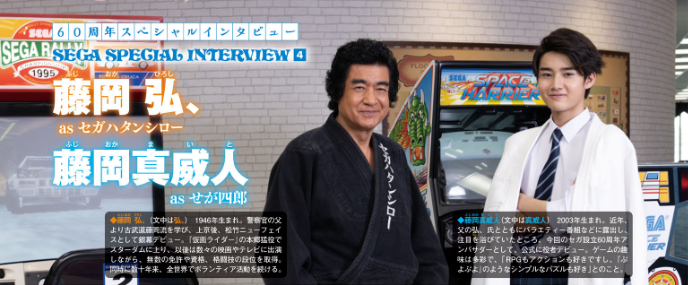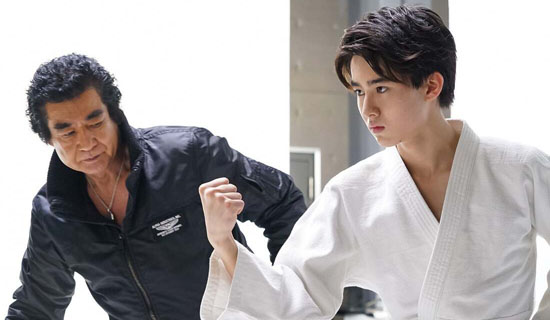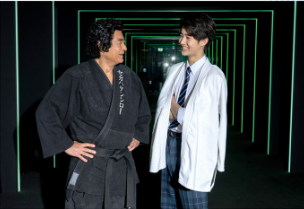Hiroshi Fujioka and his son Maito came out wearing jet black and pure white martial arts gi, and we took this opportunity to interview them as two generations of Sega ambassadors. What do they think of Sega? What do they think of games? What was passed down from father to son? It’s a very passionate conversation.
Hiroshi Fujioka – Born in 1946, he learned the Fujioka style of martial arts from his policeman father. After moving to Tokyo, he made his silver screen debut. Rising to stardom through playing Takeshi Hongo in Kamen Rider, he continued appearing in many movies and TV shows, as he also continued to obtain more martial arts accreditation. He did all this while performing volunteer work all over the world for many years.
Maito Fujioka – Born in 2003, in recent years he’s been getting attention by appearing on TV variety programs with this father. As the ambassador for Sega on its 60th anniversary, he’s made his official acting debut. His interest in games is quite varied, liking not only RPG and action games but also simple puzzle games like Puyo Puyo.
Taking The Job Because Games Can Train Instincts
I appreciate you both sitting down for this interview today.

(Maito) Not at all, I’ve really been looking forward to it.
(Hiroshi) I’m just excited to be working for the first time in awhile. I typically travel to over 100 different countries, and there are urgent situations going on all over. Granted it doesn’t seem to be as severe in Japan. But I think all of this has made regular people think about things on a more global level. Sorry…I didn’t mean to go on about that.
No, not at all. Did you start becoming more aware of things on a global level when you were in the movie “Ghost Warrior“?
(Hiroshi) That was one of the big factors. I was the first Japanese actor to enter the Screen Actors Guild, and I got the lead role that I auditioned for. I may have been the first Asian man in a lead role since Bruce Lee? And I’ve been traveling all over the world for over 40 years doing volunteer martial arts exhibitions, as a sort of cultural exchange. I’ve also been doing it for the “Fujioka Hiroshi Tankentai” program as well: I’ve been exploring dangerous areas throughout the world for six years now. I’ve really taken the experiences I’ve had from taking on those sorts of challenges into myself.
Compared to that type of work, playing Segata Sanshirou was quite an odd job for you. Why did you decide to take it?
(All of the original Segata Sanshirou commercials that Hiroshi Fujioka appeared in during the Saturn era)
(Hiroshi) I have the spirit of wanting to take on unknown and difficult things. Being in life and death situations, I came to understand the differences between truth, reality, and fact. There’s no greater treasure than experiencing those sorts of things and gaining information from them. I’ve been able to survive because of them.
In other words, everything is an experience.
(Hiroshi) Yeah. A few minutes or seconds can quite literally be the difference between life and death in those situations. But that’s not information I got from a computer, but rather from maximizing my own internal danger sensors. I wouldn’t be able to survive without those instincts.
So then back when Sega contacted you…
(Hiroshi) I feel those sorts of things expand the world outward, train your sense of imagination, and help brace for future crisis, so I was excited about the offer. Games with a strong sense of imagination are like prediction or foresight, in a way. They develop new abilities in people, and give excitement. I felt that they could help train instincts as well.
Did you have much experience with games up until that point?
(Hiroshi) I knew about them, but I’d never been directly involved with them in any way. And so I’m very grateful to Sega for having given me such an exciting new challenge to take on.
So then the year that you spent playing Segata Sanshirou was exciting?
(Hiroshi) It was a lot of fun…I completely deviated from all of the preconceived ideas and theories that I’d cultivated as an actor up until that point.
(Laughs) It may not feel like a performance that someone who had appeared in seven different period dramas would have given.
(Hiroshi) It was so different that it seemed like some of my colleagues were going to say something about how uncharacteristic it was. But you could say that it was something of a big turning point for me.
Maito, how did you feel about getting an offer to play the successor to that character?
(Maito) I never expected to be offered a role so important as being an ambassador, much less for it to be a character who is Sega Sanshirou’s son, so I was very surprised. Being the son of such a legendary character, expectations were higher than normal, and I felt pressure from knowing I needed to really give it my all. But I turned those misgivings into determination for the role.
(The final in a series of Sega commercials featuring Maito Fujioka as Sega Shirou, as well as an appearance by his father)
Training the Samurai Mind Through Games
Being that this was the first time you co-starred in anything with your father, was he different on set from the way he is at home?
(Maito) Normally when he’s focused on something, his expression suddenly changes. He focuses very intently on whatever the task at hand is until it’s done, and then he suddenly returns to normal. When the camera is on him, his expression and aura change complete. Of course he relaxes when he’s not working, but I think the way he changes between those two modes is really amazing.
(Hiroshi) That’s because he spends his time off sleeping around the house in his underwear. I’ve been teaching him Karate and Judo ever since he was young, and that’s been to train his “samurai mind” in the Fujioka tradition. A samurai is able to be decisive, determined, and prepared in an instant, all based on his conviction. This way even when he’s laughing, he’s concentrating with all of his might on surviving an encounter with an enemy. I’ve been imprinting this onto him little by little, to make him learn this.
It’s the study of how to be a good emperor.
(Hiroshi) I feel like it’s probably been annoying for him in the past, but I also suspect that now he’s been thinking “Ahh, the things he’s always been telling me are actually true!”. Ha-ha-ha.
(Laughs) Maito, you’ve managed to have actual experience with games amidst all of this, right? And have you made your father mad by playing too many of them?
(Maito) I definitely have! (Laughs) I love games.
That’s great. Do you two ever play them together?
(Hiroshi) I’m from the Shouwa era, so I’m not always so great with modern technology. It changes so quickly, and if I spend time on learning that it means I’m neglecting things elsewhere. Balance is important in all things. l tell him to watch how much he games so that he doesn’t spend all of his time playing them. Getting completely into something is fine, but the issue is commitment. That’s why I’m licensed to be in the land, sea, air, and even the bottom of the ocean.
You’re basically the submarine pilot from the book “Japan Sinks” (Laughs)
(Hiroshi) I’m mastering the use of guns too. Since I’m able to fight without a weapon as well, this is fighting preparation. Information is preparation as well. This is Sega’s 60th anniversary, but it’s also my 55th anniversary in the entertainment industry. It’s difficult enough to maintain and keep up to date this wealth of knowledge that I’ve accumulated throughout this 55 year fight, so I’m unable to concentrate on any one particular game. But games involve making snap decisions and coming to conclusions to produce results. This is close the idea of the “samurai mind”, and I believe games help to train the mind.
An Appeal to Sega
Maito, did you know anything about Sega before this?
(Maito) I’d heard that they had a reputation of always being 10 years ahead of everyone else. A normal business will offer products appropriate to the time in which they’re made, and predicting what’s to come means you’re offering products that no one else is yet. And that’s anything but normal. Also when I started playing Sega Shirou, I saw a lot of reactions first hand from people on social media saying that they liked it when Sega does things like this. So I very much hope that they value this sort of way of presenting themselves as they move forward.
Sega is the very definition of “pioneer”. The vision they promote as a group is “Be a Game Changer”, so I think that matches both of your thoughts pretty well.
(Maito) Wow!
(Hiroshi) Ohh. I’d absolutely like for him to continue taking on difficult challenges like this one. He may feel a lot of pressure from them, but a person can’t grow without that. I’ve been telling him things like “Don’t run away, don’t lose out, don’t yield, don’t give up” to the point where his head probably hurts, ever since he was young. Right?
(Maito) So many times I can’t even count them! (Laughs)
(Laughs) I suspect that those words may be of great aid to you going forward, Maito. Would you happen to have any words for Sega themselves, and our readers who love Sega?
(Hiroshi) I’d like for them to keep being innovators and taking on challenges. And at the same time, I want to continue saying that when it comes to what we can do to repay our ancestors, it really comes down only to taking that spirit that’s been passed down from them and taking on new challenges, and establishing a future. No individual or business ought disregard their ancestry, but everyone is also their own miraculous being. So I’d also like for them to carry with them their families, ancestors, country, and the world. Doing nothing but satisfying your own ego and desires is simply creating a machine that produces nothing but waste.
W…waste…
(Hiroshi) I hope that Sega creates games that convey those principles. Popular games have a profound impact on young people, so I’d like to see more games that take the foundations of our very hearts into account. I believe this is both a topic for businesses that create games, as well as a calling. Since Maito and I are involved in this, we also have that same responsibility too. And as such, games can help protect against the various collapses happening right now, and deepen our bonds with one another. There are all sorts of tricks present within them, and so they allow you to be conscious of problems as you’re having fun playing them. I’m confident that quite a few games teach people lessons without them actually realizing it.
It’s a presentation of problems that’s unique to the medium of games.
(Hiroshi) Yes, and recognizing it is transforming. A motto of mine is that since I possess sincerity, whether it’s children or opponents that I’m interacting with, to always do so with my true intentions. By doing that, I reach them. Continuing to send out these types of soulful messages to young people from where I currently am in life, I believe often produces good results. For example, the Sega Sanshirou ads won commercial awards two years in a row. I make a point to be a practitioner, not a critic.
Your conduct is very well known.
(Hiroshi) Businesses also will eventually fail if they do nothing but accumulate profits without seriously sending messages that appeal to the world. I believe that Sega will succeed!…Was that too much pressure, I wonder?
No, I believe that was a very strong and righteous conversation. Maito, do you also have anything you’d like to say as the ambassador for Sega on their 60th anniversary, about Sega and your own aspirations?
(Maito) As the ambassador for Sega on their 60th anniversary, Sega Shirou, I’ll be conveying Sega’s charms to you as they continue to advance forward, and I myself will continue taking on new challenges as well. I hope that you’ll all continue your support.


